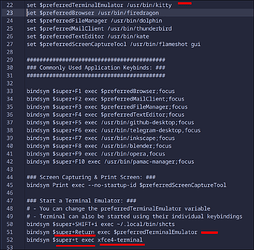Hello. I’m running latest Garuda i3wm edition, the problem as follows: whenever I’m trying to run setup-assistant (from rofi, terminal emulator or garuda-welcome GUI), for some reason it opens xfce4-terminal instead of kitty which is set to be the default terminal emulator. printenv confirms that kitty is set to be the default:
TERMINFO=/usr/lib/kitty/terminfo
TERM=xterm-kitty
I’ve tried to look up what I could’ve possibly messed up when configuring i3wm and picom, but to no avail. I don’t remember setup-assistant opening up this terminal before, so let me know if it’s possible to fix this.
garuda-inxi:
System:
Kernel: 6.9.10-zen1-1-zen arch: x86_64 bits: 64
compiler: gcc v: 14.1.1 clocksource: hpet avail: acpi_pm
parameters: BOOT_IMAGE=/vmlinuz-linux-zen
root=UUID=e47f976f-5ac6-486f-a440-af4d2cc1d294 rw
rootflags=subvol=@ quiet loglevel=3 ibt=off
Desktop: i3 v: 4.23 with: i3bar tools:
avail: i3lock,xautolock vt: 7 dm: LightDM v: 1.32.0
Distro: Garuda base: Arch Linux
Machine:
Type: Desktop Mobo: HUANANZHI model: X79 v: V6.11
serial: <superuser required> uuid: <superuser required>
BIOS: American Megatrends v: 4.6.5 date: 09/06/2018
CPU:
Info: model: Intel Xeon E5-2650 v2 bits: 64 type: MT MCP
arch: Ivy Bridge level: v2 built: 2012-15
process: Intel 22nm family: 6 model-id: 0x3E (62)
stepping: 4 microcode: 0x42E
Topology: cpus: 1x cores: 8 tpc: 2 threads: 16
smt: enabled cache: L1: 512 KiB
desc: d-8x32 KiB; i-8x32 KiB L2: 2 MiB desc: 8x256 KiB
L3: 20 MiB desc: 1x20 MiB
Speed (MHz): avg: 2997 high: 3400 min/max: 1200/3400
scaling: driver: intel_cpufreq governor: performance
cores: 1: 2022 2: 3009 3: 3400 4: 3400 5: 3220 6: 3133
7: 3400 8: 3400 9: 3138 10: 3400 11: 2925 12: 2949
13: 3002 14: 1254 15: 2906 16: 3400 bogomips: 83206
Flags: avx ht lm nx pae sse sse2 sse3 sse4_1 sse4_2
ssse3 vmx
Vulnerabilities: <filter>
Graphics:
Device-1: NVIDIA GP107 [GeForce GTX 1050 Ti]
vendor: ASUSTeK driver: nvidia v: 555.58.02
alternate: nouveau,nvidia_drm non-free: 545.xx+
status: current (as of 2024-06; EOL~2026-12-xx)
arch: Pascal code: GP10x process: TSMC 16nm
built: 2016-2021 pcie: gen: 1 speed: 2.5 GT/s lanes: 16
link-max: gen: 3 speed: 8 GT/s ports: active: none
off: DP-1 empty: DVI-D-1,HDMI-A-1 bus-ID: 04:00.0
chip-ID: 10de:1c82 class-ID: 0300
Display: x11 server: X.Org v: 21.1.13 compositor: Picom
v: git-89c2c driver: X: loaded: nvidia
unloaded: modesetting alternate: fbdev,nouveau,nv,vesa
gpu: nvidia,nvidia-nvswitch display-ID: :0 screens: 1
Screen-1: 0 s-res: 1280x1024 s-dpi: 34
s-size: 955x764mm (37.60x30.08") s-diag: 1223mm (48.15")
Monitor-1: DP-1 mapped: DP-0 note: disabled
model-id: RTK 0x1d1a serial: <filter> built: 2015
res: 1280x1024 hz: 75 dpi: 32 gamma: 1.2
size: 1020x570mm (40.16x22.44") diag: 1168mm (46")
ratio: 16:9 modes: max: 1024x768 min: 640x480
API: Vulkan v: 1.3.279 layers: 1 device: 0
type: discrete-gpu name: NVIDIA GeForce GTX 1050 Ti
driver: nvidia v: 555.58.02 device-ID: 10de:1c82
surfaces: xcb,xlib
API: OpenGL Message: Unable to show GL data. glxinfo is
missing.
Audio:
Device-1: Intel C600/X79 series High Definition Audio
driver: snd_hda_intel v: kernel bus-ID: 00:1b.0
chip-ID: 8086:1d20 class-ID: 0403
Device-2: NVIDIA GP107GL High Definition Audio
vendor: ASUSTeK driver: snd_hda_intel v: kernel pcie:
gen: 3 speed: 8 GT/s lanes: 16 bus-ID: 04:00.1
chip-ID: 10de:0fb9 class-ID: 0403
Device-3: Razer USA USB Sound Card
driver: hid-generic,snd-usb-audio,usbhid type: USB
rev: 2.0 speed: 12 Mb/s lanes: 1 mode: 1.1
bus-ID: 1-1.8:3 chip-ID: 1532:0529 class-ID: 0300
serial: <filter>
API: ALSA v: k6.9.10-zen1-1-zen status: kernel-api
tools: N/A
Server-1: PipeWire v: 1.2.1 status: active with:
1: pipewire-pulse status: active 2: wireplumber
status: active 3: pipewire-alsa type: plugin 4: pw-jack
type: plugin tools: pactl,pw-cat,pw-cli,wpctl
Network:
Device-1: Realtek RTL8111/8168/8211/8411 PCI Express
Gigabit Ethernet driver: r8169 v: kernel pcie: gen: 1
speed: 2.5 GT/s lanes: 1 port: d000 bus-ID: 07:00.0
chip-ID: 10ec:8168 class-ID: 0200
IF: enp7s0 state: up speed: 100 Mbps duplex: full
mac: <filter>
IF-ID-1: neko-tun state: unknown speed: 10000 Mbps
duplex: full mac: N/A
Info: services: NetworkManager,systemd-timesyncd
Drives:
Local Storage: total: 1.82 TiB used: 14.66 GiB (0.8%)
SMART Message: Required tool smartctl not installed.
Check --recommends
ID-1: /dev/sda maj-min: 8:0 vendor: Samsung
model: SSD 860 EVO 500GB size: 465.76 GiB block-size:
physical: 512 B logical: 512 B speed: 6.0 Gb/s tech: SSD
serial: <filter> fw-rev: 4B6Q scheme: MBR
ID-2: /dev/sdb maj-min: 8:16 vendor: Seagate
model: ST1000DM010-2EP102 size: 931.51 GiB block-size:
physical: 4096 B logical: 512 B speed: 6.0 Gb/s
tech: HDD rpm: 7200 serial: <filter> fw-rev: CC43
scheme: MBR
ID-3: /dev/sdc maj-min: 8:32 vendor: Hitachi
model: HTS547550A9E384 size: 465.76 GiB block-size:
physical: 4096 B logical: 512 B speed: 3.0 Gb/s
tech: HDD rpm: 5400 serial: <filter> fw-rev: A60A
scheme: GPT
Partition:
ID-1: / raw-size: 80 GiB size: 80 GiB (100.00%)
used: 13.76 GiB (17.2%) fs: btrfs dev: /dev/sdc3
maj-min: 8:35
ID-2: /boot raw-size: 512 MiB size: 512 MiB (100.00%)
used: 280.9 MiB (54.9%) fs: btrfs dev: /dev/sdc2
maj-min: 8:34
ID-3: /home raw-size: 385.25 GiB
size: 385.25 GiB (100.00%) used: 641.2 MiB (0.2%)
fs: btrfs dev: /dev/sdc4 maj-min: 8:36
ID-4: /var/log raw-size: 80 GiB size: 80 GiB (100.00%)
used: 13.76 GiB (17.2%) fs: btrfs dev: /dev/sdc3
maj-min: 8:35
ID-5: /var/tmp raw-size: 80 GiB size: 80 GiB (100.00%)
used: 13.76 GiB (17.2%) fs: btrfs dev: /dev/sdc3
maj-min: 8:35
Swap:
Kernel: swappiness: 133 (default 60)
cache-pressure: 100 (default) zswap: no
ID-1: swap-1 type: zram size: 15.54 GiB
used: 0 KiB (0.0%) priority: 100 comp: zstd
avail: lzo,lzo-rle,lz4,lz4hc,842 max-streams: 16
dev: /dev/zram0
Sensors:
System Temperatures: cpu: 27.0 C mobo: N/A gpu: nvidia
temp: 56 C
Fan Speeds (rpm): N/A gpu: nvidia fan: 0%
Info:
Memory: total: 16 GiB available: 15.54 GiB
used: 3.31 GiB (21.3%)
Processes: 379 Power: uptime: 27m
states: freeze,standby,mem,disk suspend: deep
avail: s2idle,shallow wakeups: 0 hibernate: platform
avail: shutdown, reboot, suspend, test_resume
image: 6.18 GiB services: upowerd,xfce4-power-manager
Init: systemd v: 256 default: graphical tool: systemctl
Packages: pm: pacman pkgs: 1340 libs: 390
tools: pacseek,paru Compilers: gcc: 14.1.1
Shell: garuda-inxi default: Bash v: 5.2.26
running-in: kitty inxi: 3.3.35
Garuda (2.6.26-1):
System install date: 2024-07-19
Last full system update: 2024-07-20
Is partially upgraded: No
Relevant software: snapper NetworkManager dracut nvidia-dkms
Windows dual boot: <superuser required>
Failed units:
